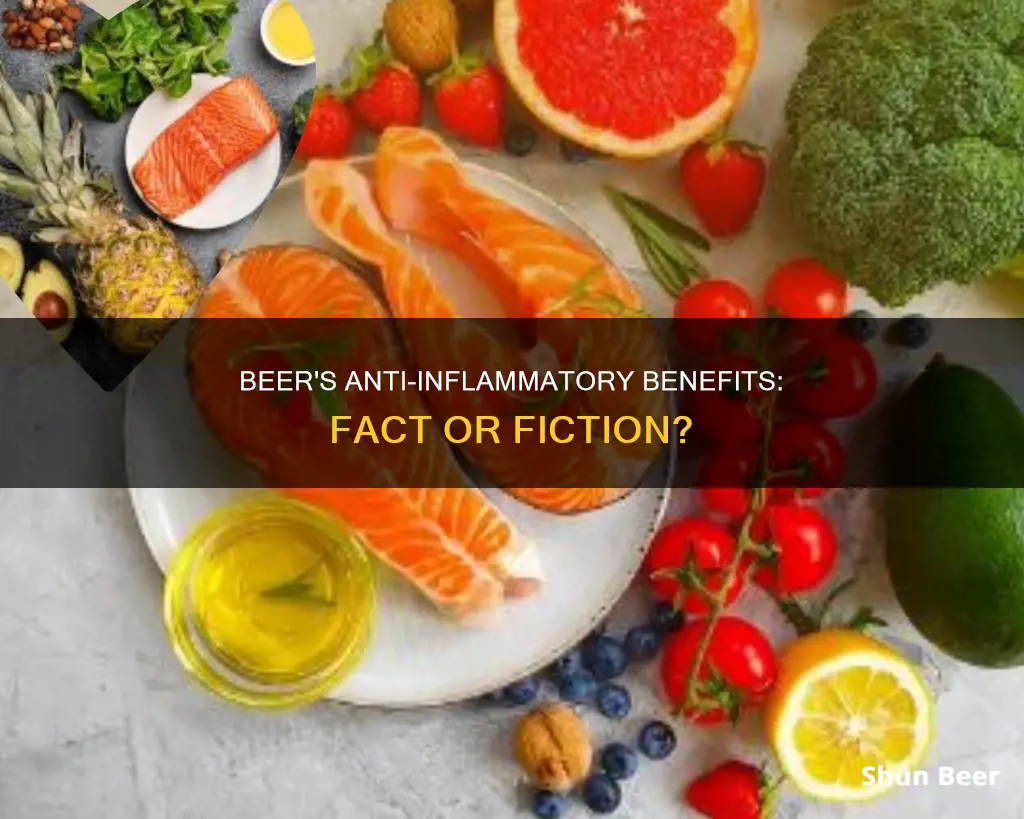
Alcohol is a catalyst for inflammation in the body, and drinking it can trigger inflammatory responses that lead to several diseases. Inflammation is the body's natural response to injury or infection, and alcohol consumption can cause both acute and chronic inflammation. Acute inflammation caused by alcohol consumption is evident through hangover symptoms such as headaches, nausea, or vomiting, which usually resolve within a couple of days. Chronic inflammation, on the other hand, gets worse over time and is associated with long-term alcohol use, slowly destroying the body's tissues.
Alcohol metabolism produces a toxic chemical called acetaldehyde, which causes oxidative stress and cell damage, particularly to the liver, brain, pancreas, and gastrointestinal tract. Additionally, alcohol disrupts the balance of good and bad bacteria in the gut microbiome, leading to systemic inflammation that can result in gastrointestinal, cardiovascular, autoimmune, metabolic, and neurological diseases. Alcohol consumption also increases gut permeability, allowing bacterial toxins called lipopolysaccharides to leak into the bloodstream and triggering the release of pro-inflammatory proteins. Furthermore, alcohol weakens the immune system, reducing its ability to fight infections and regulate inflammation effectively.
While all types of alcohol can trigger inflammation, red wine, rich in antioxidants, may cause less inflammation when consumed in moderation. However, excessive or chronic alcohol consumption of any kind can have detrimental effects on health and increase the risk of various diseases.
| Characteristics | Values |
|---|---|
| Inflammation type | Acute and chronic |
| Inflammation causes | Hangover symptoms, worsening of gout, rheumatoid arthritis, and other inflammatory conditions |
| Alcohol's effect on inflammation | Alcohol can cause inflammation and worsen inflammatory conditions, but moderate drinking may reduce the risk of developing rheumatoid arthritis |
| Recommended alcohol intake | Men: Two drinks or less per day. Women: One drink or less per day |
What You'll Learn

Beer and rheumatoid arthritis
Beer and Inflammation
According to a few studies, moderate alcohol consumption can reduce certain biomarkers of inflammation, including c-reactive protein (CRP), interleukin-6, and TNF-alpha receptor 2. As a result, moderate drinking may reduce the risk of developing rheumatoid arthritis. For example, a 2015 review found that moderate drinking could reduce certain inflammation markers, while a 2020 study showed that moderate alcohol consumption may reduce the severity of nonalcoholic fatty liver disease. However, excessive drinking can have the opposite effect, increasing inflammation and causing liver damage.
Beer, RA Medications, and Interactions
Beer and other alcoholic beverages can interfere with RA medications, leading to serious health complications. For instance, drinking alcohol while taking methotrexate, a common medication for RA, can increase the risk of liver damage. Alcohol can also alter liver function markers, leading to incorrect medication dosages. In addition, drinking alcohol with nonsteroidal anti-inflammatory drugs (NSAIDs) like ibuprofen or naproxen can increase the risk of stomach bleeding and ulcers.
Individual Experiences with Beer and RA
Individual experiences with drinking beer or alcohol when living with RA vary. Some people with RA find that even a small amount of alcohol can cause negative side effects, such as increased joint pain, fatigue, fragmented sleep, nausea, and mood changes. On the other hand, some small research studies suggest that moderate alcohol consumption may reduce RA symptoms, possibly due to its anti-inflammatory effects. However, a 2018 study of 188 people with early RA found no difference in joint inflammation between those who drank alcohol in moderation and those who did not.
Recommendations
If you have rheumatoid arthritis and want to drink beer or other alcoholic beverages, it is essential to speak with your doctor first. They can advise you on the risks and benefits, as well as any potential interactions with your medications. In general, drinking in moderation is key, and it is important to monitor how alcohol affects your RA symptoms and make adjustments accordingly.
Antibiotics and Beer: A Safe Mix?
You may want to see also

Beer and gout
Gout is a form of arthritis that affects the joints, most commonly the big toe, ankle, and knee. It is caused by a buildup of uric acid in the blood, which forms crystals in the joints, causing pain, redness, swelling, and heat. Beer and liquor have long been associated with the risk of gout, whereas wine has not. However, an internet-based case-crossover study found that all types of alcoholic beverages, including wine, were associated with an increased risk of recurrent gout attacks.
Beer is particularly implicated in causing gout due to its relatively high levels of purines, which are organic compounds that help form the base of human DNA. During digestion, purines are broken down into uric acid. Normally, the kidneys remove uric acid from the body. However, in individuals with gout, the uric acid crystallizes into microscopic lancelets that accumulate around the joints, causing intense pain and inflammation.
Alcohol raises uric acid levels in the body in several ways. Firstly, some alcoholic beverages, especially beer, are high in purines. Secondly, alcohol increases the breakdown of purines in the body, leading to higher levels of uric acid. Thirdly, alcohol can slow down the rate at which the kidneys remove uric acid from the blood.
Research has shown a clear link between alcohol consumption and the risk of gout. A study of over 700 participants with gout found a significant dose-response relationship between the amount of alcohol consumption and the risk of recurrent gout attacks. Compared to no alcohol consumption, consuming 1-2 alcoholic beverages in a day increased the risk of a gout attack by 36%, while consuming more than 2-4 drinks increased the risk by 51%.
While all types of alcohol can contribute to gout, beer is generally considered the worst offender due to its higher purine content. A 2004 study in The Lancet found that drinking two or more beers daily doubled the risk of gout compared to non-beer drinkers. However, other studies have shown that wine consumption can also increase the risk of gout attacks.
If you have gout or are at risk of developing it, it is advisable to limit your alcohol intake or abstain completely. This is especially important during the first six months after starting uric acid-lowering medication. While eliminating alcohol may not reverse gout, reducing alcohol consumption can help lower uric acid levels and decrease the risk of gout flares.
Millenials' Work Culture: Beer on the Job?
You may want to see also

Beer's anti-inflammatory properties
Beers Anti-Inflammatory Properties
While beer is not typically thought of as an anti-inflammatory drink, some studies have shown that moderate consumption may have anti-inflammatory effects in the body. Here are some key points about beers anti-inflammatory properties:
Moderate Consumption
It's important to emphasise that the keyword here is "moderate." Excessive alcohol consumption, including beer, is associated with chronic inflammation and can lead to various health issues. However, moderate consumption, which is generally defined as one drink or less per day for women and two drinks or less per day for men, may have some anti-inflammatory benefits.
Reduced Inflammatory Markers
Several studies have found that moderate alcohol consumption, including beer, is associated with lower levels of systemic inflammatory markers. This effect has been observed in different geographical areas, suggesting that ethanol itself may be responsible for the potential anti-inflammatory properties of beer.
Rheumatoid Arthritis Risk
Moderate drinking may reduce the risk of developing rheumatoid arthritis (RA). Some studies indicate that moderate alcohol consumption can lower biomarkers of inflammation, including c-reactive protein (CRP), interleukin-6, and TNF-alpha receptor 2, which are associated with a reduced risk of RA.
Cardiovascular Disease Risk
The anti-inflammatory effects of moderate alcohol consumption are also linked to a reduced risk of cardiovascular disease. Lower levels of inflammation biomarkers, such as CRP, fibrinogen, and white blood cell count, are associated with a decreased risk of coronary heart disease.
Gout Considerations
It is important to note that beer consumption can be problematic for individuals with gout, a form of inflammatory arthritis. Beer is high in purines, which can trigger gout attacks by increasing uric acid levels in the body. Therefore, drinking less beer or abstaining from it can help reduce the risk of gout or worsen its symptoms.
Overall Health Considerations
While moderate beer consumption may have some anti-inflammatory benefits, it is essential to consider overall health. Excessive alcohol consumption is linked to various health issues, including liver disease, heart disease, certain types of cancer, and other chronic conditions. Maintaining a healthy diet, exercising regularly, and not smoking are more effective ways to protect your health and reduce inflammation.
Do LCBO Gift Cards Work at Beer Store?
You may want to see also

Beer and systemic inflammation
Alcohol consumption is linked to inflammation in the body. Inflammation is the body's natural defence mechanism against harmful invaders, such as pathogens, and is a necessary process for healing. However, chronic inflammation lasting months or years can lead to various diseases, including cardiovascular diseases, rheumatoid arthritis, chronic obstructive pulmonary disease (COPD), Alzheimer's disease, and chronic kidney disease (CKD).
When the body breaks down alcohol, it produces inflammatory compounds, including acetaldehyde, cytokines, chemokines, and reactive oxygen species. These by-products can cause damage to the gut, liver, and other organs, triggering an inflammatory response. Alcohol also disrupts the gut microbiome, allowing harmful bacteria to proliferate and causing systemic inflammation.
Moderate alcohol consumption, however, may have some anti-inflammatory benefits. Studies in Germany, Scotland, and France have shown that moderate daily alcohol intake of up to 40 grams was associated with lower levels of inflammatory markers compared to non-drinking and heavy drinking. This suggests that ethanol itself may be responsible for the anti-inflammatory effects observed in moderate drinkers.
Beer, being an alcoholic beverage, will also have similar effects on inflammation as other types of alcohol. While moderate consumption may provide some anti-inflammatory benefits, excessive drinking will lead to higher levels of inflammation in the body. Therefore, it is essential to drink in moderation to maintain good health.
Beer Enemas: Do They Work or Are They Dangerous?
You may want to see also

Alcohol's impact on the gut
Alcohol can have a significant impact on gut health, and excessive consumption can lead to various adverse effects. Here are some ways in which alcohol affects the gut:
Encouraging the Growth of Pro-Inflammatory Gut Bacteria
Alcohol consumption, especially in large amounts, can disrupt the delicate balance of bacteria in the gut microbiome. While most of the bacteria are beneficial and have a symbiotic relationship with the body, alcohol can favour the growth of potentially pathogenic microbes and reduce beneficial ones. This imbalance, known as dysbiosis, can lead to increased inflammation not only in the gut but also systemically throughout the body.
Damaging the Intestinal Lining
The harmful, inflammatory gut bacteria promoted by alcohol consumption can cause damage to the intestinal lining. This damage results in a "leaky gut," where the intestinal wall becomes more permeable, allowing bacteria and toxins to enter the bloodstream. This can have negative consequences for other organs, including the liver.
Causing Gastritis
Excessive alcohol consumption can disrupt the production of mucus that lines the stomach, leading to inflammation of the stomach lining, a condition known as gastritis. Gastritis may be asymptomatic, but it can also cause symptoms such as abdominal pain, nausea, vomiting, and a burning sensation in the upper abdomen. Repeated episodes of gastritis increase the risk of more severe conditions, including ulcers, anemia, and stomach cancer.
Altering the Gut's Fungal Diversity
Alcohol consumption disrupts the normal fungal diversity in the gut, leading to an overgrowth of a type of yeast called candida. This shift in the gut's fungal population increases gas production, resulting in uncomfortable bloating in the abdomen.
Liver Damage
Heavy alcohol use can cause fat buildup in the liver, leading to alcoholic fatty liver disease or alcoholic steatohepatitis. The breakdown of alcohol by the liver creates toxins that damage liver cells and promote inflammation. These toxins can lead to liver failure, liver cancer, or cirrhosis, which are all serious and potentially life-threatening conditions. However, alcoholic fatty liver disease can be reversed if caught early through lifestyle modifications, including reducing or eliminating alcohol consumption.
Impact on the Pancreas
Alcoholic pancreatitis is a painful inflammation of the pancreas caused by heavy alcohol use. The pancreas metabolizes alcohol into toxic byproducts that damage the pancreatic ducts. Additionally, enzymes that would normally be released into the digestive tract build up inside the pancreas and begin to digest it, causing damage. Alcohol-induced pancreatitis is most common in individuals who consume four to five drinks per day over more than five years, and the risk is even higher for those who smoke.
It is important to note that moderate alcohol consumption, defined as no more than one drink per day for women and no more than two drinks per day for men, is generally considered safe and is less likely to cause gut problems. However, for individuals with underlying conditions such as nonalcoholic fatty liver disease, even moderate alcohol consumption can have detrimental effects on the gut.
Beer Slug Traps: Do They Work?
You may want to see also
Frequently asked questions
Yes, alcohol can cause inflammation across the body. However, moderate drinking may reduce the risk of developing rheumatoid arthritis (RA) and cardiovascular disease.
Acute inflammation is when the body has an immediate inflammatory reaction to consuming alcohol, which can be evident through 'hangover' symptoms such as headaches, nausea or vomiting. Chronic inflammation gets worse over time.
Beer contains ethanol, which is largely responsible for the anti-inflammatory effects of alcoholic beverages.







